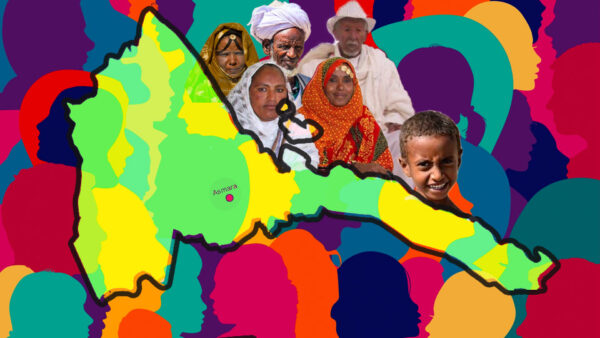Eritrea: Choosing Love, Hope Over Hate, Fear

The events at Aldia Islamic School, the address of its Chairman of the Board Mr. Mussa Mohammed Nur; his arrest on October 27, the October 31 demonstrations that followed it and the series of cellphone videos that were shared with the world (this, and this) the arrest of the demonstrators, followed by cordoning off neighborhoods and rounding up and torturing hundreds of Eritreans including minors with the State unmasking to reveal itself for the Police State it is; the diverse Diaspora Eritrean demonstrations against the arrest of the demonstrators (for example: London in front of Eritrean embassy) have made late October and early November 2017 unseasonal months.
Since all of these events have been covered–and protested–more than adequately by freedom-loving Diaspora Eritreans and lied about by pro-government Eritreans, I won’t rehash them. Since the government and its supporters have been playing their only card–the one they played after the Forto Uprising-of 2013–that all revolts against them are by “Islamists” and/or agents of Ethiopia, CIA and now Qatar–I will attempt to shed light on Mr. Mussa Mohammed Nur, now ghettoized as “aboy Hajji”; Sheria As Practiced In Eritrea Even In The Reign Of PFDJ, for those who get their knowledge about Sheria from Fox News; what does the law, the 2015 Civil Code, say about the rights of religious institutions like Diaa school; and what exactly is the fuel of our struggle against and for empowering the PFDJ.
Mr Mussa Mohammed Nur
Let’s try prefixing the man who is at the center of the latest uprising. Bitsay Mussa Mohammed Nur. Sounds reassuring, huh? Aboy Mussa Mohammed Nur. Sounds innocuous. Sheikh Mussa Mohammed Nur. A bit scary. Hajji Mussa Mohammed Nur. A jihadist, right there. It is in his name.
At the risk of offending all of you who already know this, I am going to have to address those who don’t have basic info: hajji is an honorific given to anyone who has made the pilgrimage to Mecca, a requirement on all Muslims who can afford it. That’s it. It doesn’t say the person has religious expertise; it does say the person takes his or hers (Hajjia for female) religion seriously.
There is this false choice the Eritrean government and its supporters and some atheist fundamentalists present: you either prioritize religion over state or state over religion. They reduce identity to some hierarchy, forgetting its overlapping nature. A Hajji can be a patriot, as is the case here. A patriot who takes his religion AND civil liberties very seriously, as is the case with Mr. Mussa Mohammed Nur.
Bayan Negash has written a stylized biography of Abona Mussa Mohammed Nur. I would add here that he, along with Sheik Saleh (Imam of Mesjid Sheikh Abdulkader), Said Ahmed Mohammed Hashem (later auditor-in-chief with ELF), Mulugetta Seyoum (brother of famed footballer), were some of the founders of the 5-person-cell of the ELF shortly after the demise of ELM. This was an operational cell that facilitated many of the Fedayeen operations of the ELF, which were critical in gaining popular acceptance for the front among all Eritreans. The reason he seemed unfazed by prison or death (there is no man who won’t get jailed and die in defense of his religion and creed, and we are called for to die. When a man is born, a man is dead) is because his first arrest was in 1967 and he was in and out of jail since then. “When I was first arrested in 1967,” narrates a much younger prison mate I interviewed for this article, “he visited us and said, ‘the beatings only last 3 days; endure them and say nothing: because if you talk, they will only get worse for you.'” This man should be spending his remaining days speaking with historians like Alemseghed Tesfai to fill in their gaps, and not in prison. And then, some psychiatrist, should explain what is it about the Eritrean regime that makes it go after 80 and 90 year old men: is there any other government in the world that arrests people that age?
Sheria 101: How It Is Practiced In Eritrea
Long before its creation as a State, the land we now call Eritrea had been a multi-cultural, multi-faith place. The harmonious relationship we rightfully take great pride in didn’t happen by accident: it was cultivated by people who understood that tolerance and co-existence mean you respect the values of those who are not like you even if you don’t agree with them.
This means that in Muslim Eritrea, Sheria (the Islamic path) was always there. Now before people get all terrified about the Sheria they heard from Fox News (chopping heads, tier of citizenship, compulsory observation of Islamic rituals) let me assure them that (a) it applied only to Muslims and (b) it applied only in civil cases and not criminal cases. This is very, very common in any country that has a substantial Muslim population.
Back when Asmara University was called Santa Familia, its law studies included a course called “Eritrean Sheria Law” which was taught by Dr. Nurhussein Aberra. There were Sheria courts all over Eritrea, with Sheria Appeals Court in Asmara. Still are.
Its precise application was to: marriage, divorce, inheritance and child custody. I shouldn’t refer to them in the past tense: they exist to this day. And the State–which has communal courts, zonal courts, appeals courts, and a supreme court (in theory)– is very happy to yield this to them because, with the exception of marriage (brief and happy) all the rest deal with disputes (long and miserable.) States with limited capacities would rather focus their resources on meaningful issues rather than on who is the rightful owner of a tiny room which was owned by an old man with 7 children.
Sheria courts and the Sheria system has always been voluntary. There was then, and there is now, a mechanism for someone–most likely a woman–to opt out and demand the case be heard in a civil court. There was then, and there is now, social ostracization for doing that.
I say all of this because some people were shocked when they heard Mr. Mussa Mohammed Nur say “We are Muslims; we follow our interpretation of what concerns us, Sheria [Islamic canonical law] and that is what directs us and we will change nothing.” They heard him saying “I won’t obey your secular law!” when he was saying, “until you tell me how my organization’s bylaws which are based on Sheria violate State law, I will follow it.”
There are cases where the Islamic law and State law may be in direct conflict, in which case State law supersedes. For example: bigamy is allowed (tolerated) in Islam under rare conditions; in Eritrea, there is a 2015 law that forbids bigamy under penalty of prison term and a fine. Did you hear a bunch of Muslims screaming “religious violation!”? Did they go to the streets and chant “Allahu Akber!”
How does the State and Mosque deal with marriage, divorce, inheritance, child custody and guardianship? In Eritrea, these are dealt with the Sheriah Court–a community court which is the default court for religious rituals and arbitration.
All of these are individual citizens or families interacting with the State. Now what happens if it is larger than a family, say an ENTIRE community, as was the case in Aldiaa Islamic School in Akhria, Asmara?
Religious Institutions & Secular Law
When there is an overlap between State interest (education) and religious interest (perpetuation of values), who should have the upper hand? The most authoritative accounting of what transpired in Eritrea on October 31–minors and their mothers demonstrating in Asmara and then getting arrested and beaten up for it–and the days preceding it–the arrest of Hajji Mussa Mohammed Nur–chronicles that after over a year of back-and-forth, the “Ministry of Education had given a direct order to the school administration” to make changes.
The question is: why now? The school has been in operation for 50 years; Eritrea has been an independent State ruled by the same government for 26 years. What changed? Is the school producing radicalized students? There is no evidence for that. Did the government just change its policy? If so, is there a new proclamation, new law, new regulation or new interpretation of the law?
In 2015, the Government of Eritrea issued four documents: civil code, civil procedures, penal code and penal procedures. “Issued” as in published, with government officials giving conflicting answers to whether they are in effect or published in the Eritrean Gazette.
In his address, Mr Musa Mohammednur says: “This being the case, because this school is ours, even now, whatever its shortcomings, [your] suggestions that are not compatible with our views will not have acceptance. And because we have full rights, there is nothing that should frighten or scare us.” In other words, he is convinced that he is operating within the bounds of State law and his organization’s bylaws. And in every meeting he has with government officials–Department of Religious Affairs, Ministry of Education, Ministry of Local Government–he is challenging them to produce proclamation or law that shows he is in violation of it.
The Civil Code of Eritrea, which speaks to this, was authored in 2015. I should put authored in quotation marks because it inherits the superstructure of Ethiopia’s 1960 Civil Code and updates/modernizes it. The new Civil Code has this to say about Aldiaa Islamic School and all the other religious schools (Enda Mariam, Cathedrale) that were given the direct order to align their curriculum, academic calendar, dress code and gender-mixing perfectly with the state curriculum, academic calendar and dress code:
Art. 354– Religious Institutions and Religious Communities.
Religious institutions and religious communities recognized by the State are legal persons and are governed by their own constitutions, insofar as this is not contrary to the law.
Art. 355. – Limitations.
Special legislation may determine the limits in the exercise of specific rights of personality by religious institutions and religious communities.
Art. 356. – Powers and Organs.
(1) The powers of the bodies referred to in the preceding articles as well as the organs which are authorized to represent such bodies shall be prescribed by administrative law.
(2) They may impose on such organs the observance of specified conditions or formalities for the exercise of certain rights.
After over one year of discussions, the State could not produce the “special legislation” that limits their rights. It could not show how their practice is contrary to the law. No statute, no administrative law, no proclamation. Nothing.
When they couldn’t win using law, they did the only thing they know: to use the coercive power of the State and in the process, they violated their own laws as enshrined in Article 13 (Freedom of thought), Article 14 (religious freedom) and Article 15 (Freedom of Action.) Of course, there is nothing new in this: as Eritrea’s prisons demonstrate, the only freedom the Government of Eritrea respects is Article 16: Right to Keep Silent. Unless you are in prison and they are torturing you, then that right will be superseded by your right to confess to crimes you didn’t commit and to ask for forgiveness.
The only thing that is new is that this time, young Eritreans and their mothers took to the streets. That those who are demonstrating are minors (under 18) and mothers is a reflection of Eritrea’s demographics: as adults and males are too busy plotting their next escape from the prison state to participate in demonstrations.
Hope or Fear
EPLF veterans demonstrated for better living standard. Isaias Afwerki called it shameful and embarrassing then gave press conference…. then made the leaders of the demonstration disappear. Disabled veterans who demonstrated for better care were dismissed as selfish and spoilt. And shot at and killed. Its leaders were made to disappear. We didn’t get outraged by this; we just shrugged. The government had to be given the benefit of doubt. The university students who demonstrated for their right not to be a a state property were dismissed as selfish and spoilt. Many still sided with the government: we had just come of of war with Ethiopia, they reasoned. Not the right time. The Akhria students who demonstrated are being painted as Muslim extremists (when the audience is Christian) and Jeberti only (when the audience is Muslim.) There are encouraging signs that people are not buying this: every demonstration has made two points: (a) this is not a religious issue but a civil liberty issue; (b) Eritrean Muslims and Christians will never be divided by anyone: not by extremists and certainly not by the ruling junta.
Where this is headed nobody knows. Despite the official position of the government that this is a non-story, the indications are that it is scared-to-death and has activated its entire national security apparatus. Our sleepy President is nowhere to be seen or heard from, as is his custom after every crisis– he is due for a show of nothing-to-see-here-everything-is-under-control any time now as a lollipop for the faithful. A government that arrests 93-year old men, and underage children has long lost its moral authority and legitimacy to govern. We have already established: it doesn’t have the legal authority to do what it is and has been doing. The only question is: will Eritreans, in sufficient numbers, believe in their own power and summon their courage to do something about it? Or will they give in to their fear–fear of the unknown (aslam telailom, Sheria, Allahu Akber, etc etc), fear of the brutality of the government (disappearance, torture, reprisal) and exercise their Article 16?
All we can do is to refuse to exercise Article 16: speak up, speak for those who can’t. Shout until you lose your voice. Organize. We also know that the government should no longer say it has 99.9% support amongst the people. Mzungus: it was always a lie; but now we have a series of videotapes showing it is a lie.




Awate Forum